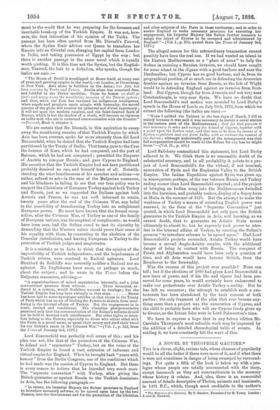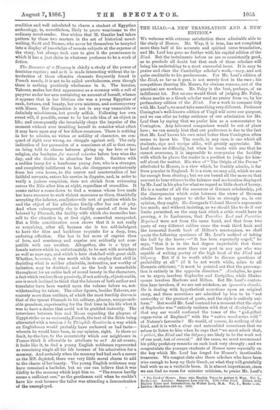A NOVEL BY TELROPHILE GAUTIER.*
THis is a clever, slight, curious tale, whose chances of popularity would be all the better if there were more of it, and if what there is were not sometimes in danger of being swamped by surround- ings. For quite a fifth of the book is taken up with a pro- logue whose people are totally unconnected with the story, except inasmuch as they act resurrectionists to the mummy whose history it relates. And, also, there is an unmerciful amount of details descriptive of Thebes, animate and inanimate, in 1491 B.C., which, though most creditable to the author's • The Romance of a Mummy. By T. Gautier. Translated by M. Youmg London: J. and 11. Maxwell.
erudition and well calculated to charm a strident of Egyptian archwology, is, nevertheless, likely to prove wearisome to the ordinary novel-reader. One wishes that M. Gautier had taken pattern by those two masters in the art of historical novel- writing, Scott and Dumas, who never let themselves be tempted into a display of knowledge of remote subjects at the expense of the story, but always took care to give it the prominence to which it has a just claim in whatever professes to be a work of fiction.
The Romance of a Mummy is chiefly a study of the power of feminine caprice ; and as it is made interesting without the in- troduction of those offensive elements frequently found in French novels, it is not to be called unwholesome, even though there is nothing positively wholesome in it. The heroine, Tahoser, makes her first appearance as a mummy with a roll of papyrus under her arm containing an account of herself, whence it appears that in her lifetime she was a young Egyptian of rank, fortune, and beauty, her own mistress, and contemporary with Moses. Her disposition is not in any way nnamiable or definitely mischievous, but purely selfish. Following her own sweet will, if possible, seems to be her sole idea of an object in life; and consequently she invariably obeys the impulse of the moment without ever troubling herself to consider what effect it may have upon any of her fellow-creatures. There is nothing in her to admire, no virtue or nobility of character, nu con- quest of right over wrong, no struggle against evil. The only indication of her possession of a conscience at all is that once, on being told to choose between giving up her love or her religion, she hesitates for several minutes before love wins the day, and she decides to abandon her faith. Smitten with a sudden fancy for a handsome young Jew, who is a stranger, and completely indifferent to her, she disappears mysteriously from her own house, to the sorrow and consternation of her faithful servants, enters his service in disguise, and, in order to verify a jealous suspicion, does not shrink from swimming across the Nile after him at night, regardless of crocodiles. It seems rather a come-down to find a woman whose love made her have recourse to such violent measures as these, thankfully accepting the inferior, coadjutor-wife sort of position which he and the object of his affections kindly offer her out of pity. And when subsequently she is forcibly carried off from her beloved by Pharaoh, the facility with which she reconciles her- self to the situation is, at first sight, somewhat unexpected. But a little consideration soon shows that it is not really so surprising, after all, because she is too self-indulgent to have the fibre and backbone requisite for a deep, true, enduring affection. She has in her more of caprice than of love, and constancy and caprice are evidently not com- patible with one another. Altogether, she is a type of female nature which is, unfortunately, to be met with nowadays as well as ages ago, and which is here sketched with great skill. Whether, however, it was worth while to employ that skill in depicting what is neither admirable, instructive, nor worthy of imitation, may be doubted ; and as the book is remarkable throughout for an entire lack of moral beauty in the characters, a fact which renders them passively, if not actively, objectionable, one is much inclined to think that the labours of both author and translator have been wasted upon the volume before us, not- withstanding its talent. The other figures, besides Tahoser, are scarcely more than outlines, of which the most forcibly drawn is that of the tyrant Pharaoh in his solitary, gloomy, unapproach- able grandeur, experiencing for the first time in his life what it was to have a desire that could not be gratified instantly. The interviews between him and Moses regarding the plagues of Egypt strike us as emiuently;French, the text of the Bible being alternated with a version a la Th6ophile Gautier in a way which an Englishman would probably have eschewed as bad taste— wherein he would have been, in our opinion, right. Is there no limit, by-the-bye, to the eccentricity which our neighbours in France think it allowable to attribute to us ? At all events, it looks like it, to find a young English nobleman represented as remaining single all his life because of his admiration for a mummy. And certainly when the mummy had had such a career as the MS. depicted, there was very little moral charm to add to the charm of her beauty. The young English nobleman may have remained a bachelor, but no one can believe that it was fidelity to the mammy which kept him so. "The reason hardly seems a sufficient one," as the gentleman said when he couldn't have his coat because the tailor was attending a demonstration of the unemployed.



































 Previous page
Previous page